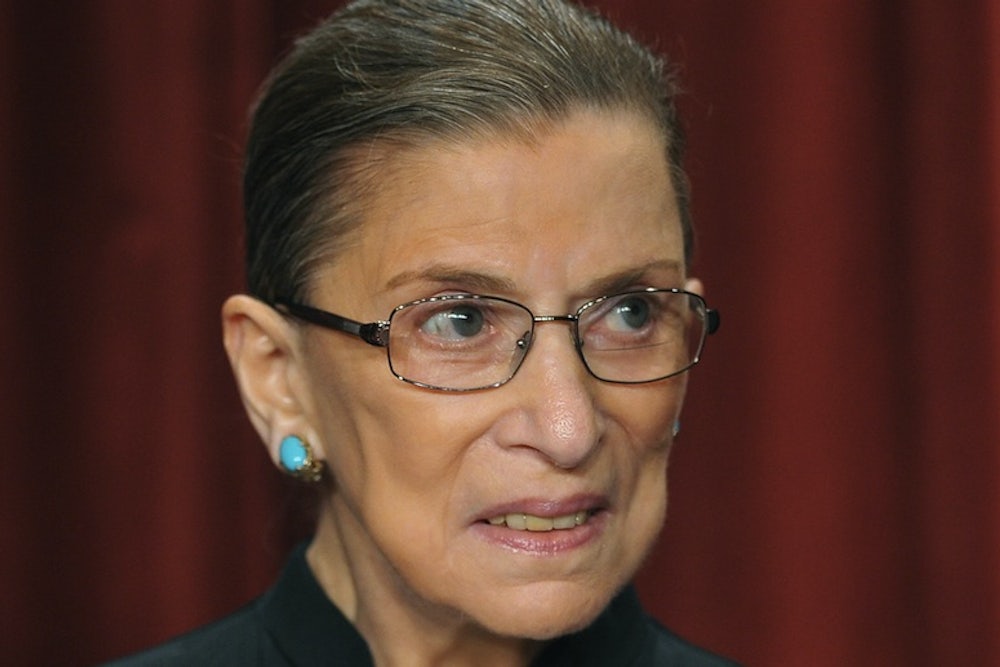Ruth Bader Ginsburg is a great American. She was a pioneer in the women’s rights legal movement, co-founding its first journal and lecturing on the topic as Columbia’s first tenured female law professor (my father was in her first-ever class, and recalls her as a great teacher). She was the American Civil Liberties Union’s general counsel after founding its Women’s Rights Project. She and her late husband, a tax law expert, strove to have an equitable marriage—he was the cook, for instance, at a time when that was unusual, and divested himself of stocks when she became a judge so that she wouldn’t have to recuse herself from cases.
And, of course, she has been a Supreme Court justice for more than 20 years, only the second woman on the highest court, where she has been a stalwart liberal vote. A few months ago, she became the first justice to officiate a same-sex marriage. Evidence early this year from her dissent in a case that ended up neutering the Voting Rights Act suggests that, at 80, she’s still got it: “Just as buildings in California have a greater need to be earthquake proofed, places where there is greater racial polarization in voting have a greater need for prophylactic measures to prevent purposeful race discrimination,” she noted (oh, snap).
So it pains me to say the following things. First: she is dead wrong about something big. And the big thing she is wrong about is insisting that she should not consider retiring soon, while she knows that a Democratic president and a Democratic-leaning Senate will be in-charge of replacing her. Which brings us to the second thing: she should retire soon.
Directly asked Tuesday about the commonly held theory that justices, who have lifetime appointments, should step down so as to maximize the chance that their replacements will be like-minded, she replied, “I think one should stay as long as she can do the job.” This follows her bizarre statements published two months ago that she need not worry because the next president, too, will be a Democrat: “The Democrats do fine in presidential elections; their problem is they can’t get out the vote in the midterm elections.”
As I reported then, it is relatively common practice for justices to step down at politically strategic moments. And why shouldn’t they? The justices, most of all, understand that they are quasi-political actors, and sometimes not even quasi. (Ginsburg dissented in Bush v. Gore.) Yet Ginsburg believes this shouldn’t factor into a justice’s decision. “Can you think as well? Can you write with the same fluency? At my age you take it year by year. I'm OK this year.”
The lifetime appointment system is a mess in dire need of reform (and the American public agrees with me). And I am really glad for Ginsburg. I’m glad she survived a bout with pancreatic cancer four years ago. I’m glad that even at 80 and despite outwardly frail appearance, she stays in shape and indeed is such an inspiration that there is a Tumblr—Notorious RBG—that testifies to her generally badass nature. I just think that in the meantime Ginsburg should go be a badass judge, with full pay, on the appellate circuit with “senior status.”
Where do I get the chutzpah? Partly it is from the knowledge that this is the way things work—that a justice appointed and confirmed in 2014 is likely to be more liberal than a justice appointed in 2018, or 2028, or any time when we do not know the composition of the presidency and Senate for sure—and that there will be untold cases on individual privacy, corporate speech and power, abortion, discrimination and voting rights, gun control, and who knows what else in the interim where we could use all the liberal justices we can get.
And partly it’s from Bush v. Gore, and other cases where the court has less blatantly but no less substantively made partisan decisions while hiding behind a phony, un-democratic veil of disinterested legal deliberating-cum-wizardry. I am sick to death of the unquestioning awe in which many Americans appear to hold the highest body of an entire third of the federal government because they are constitutionally disarmed from instead holding that branch accountable.
So let’s speak truths: Ginsburg is a liberal; Democrats will more likely get a liberal confirmed, Republicans a conservative. If Ginsburg cares about her legacy and her vision for the country, she will step down.
In fact, a modest proposal: she should step down explicitly for this reason, making clear that she wishes she could stay, and suggesting that her precedent should provoke serious discussion of common-sense constitutional reform—Supreme Court-level senior status, for instance—to make future such insanities moot.
And if that doesn’t work? Then 75-year-old, Clinton-appointed Stephen Breyer: you’re next.
